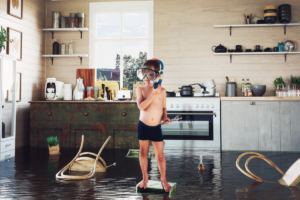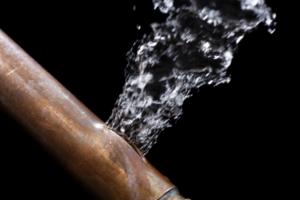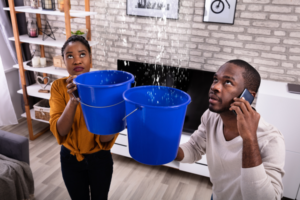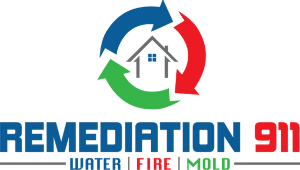The 6 Different Types of Water Damage That Can Impact Your Home
Anthony | Posted on |

When it comes to water damage, not all disasters are created equal. In fact, many types of water damage can impact your Florida home, including flooding, leaky pipes, faulty appliances, roof leaks, and more. This blog will discuss the different types of water damage homeowners face, how to protect your property, and what to do when water damage strikes.
Let’s dive in.
Flooding vs. Water Damage
While flooding and water damage sound similar, they’re very different things.
Water damage is generally caused by plumbing (an overflowing bathtub, for example, leaky pipes, or a blocked sink). On the other hand, flooding is usually the result of natural causes.
Hurricanes, natural disasters, and heavy rain can all cause flooding. While flooding can cause water damage, not all water damage is flooding.
If you’re not sure what your homeowners insurance policy covers, reach out to the company directly. As flooding has become a more common problem throughout the US, many homeowners insurance companies are changing the standards for what they will and will not reimburse. Flood insurance policies, meanwhile, have become more expensive and more limited.
 To protect your home from water damage, it’s essential to have good homeowners insurance coverage and ample flood insurance. Also, if you experience water damage, don’t wait to call a remediation company like Remediation 911. Our team will evaluate the water damage, identify the source, stop further damage from occurring, and make a recovery plan.
To protect your home from water damage, it’s essential to have good homeowners insurance coverage and ample flood insurance. Also, if you experience water damage, don’t wait to call a remediation company like Remediation 911. Our team will evaluate the water damage, identify the source, stop further damage from occurring, and make a recovery plan.
Because water damage can cause such severe problems so quickly, you just can’t afford to wait around for help. No matter how the water damage happened, we’re here for you.
The 6 Most Common Types of Water Damage (+ How They Happen)
While no water damage is good water damage, some types can be more damaging than others. There may also be a difference in insurance coverage, depending on what kind of water damage you have in your home.
Here are six of the most common types of water damage affecting homes today:
1. Burst Pipes
Burst pipes are common in frigid climates, but they do affect Florida homeowners. Aging sewage systems, changing water levels, and natural disasters are all to blame.
When pipes burst, they can cause extensive water damage, especially if the pipe bursts behind a wall or beneath your flooring.
 How to protect yourself: While there’s no way to prevent burst pipes entirely, you can protect your property by replacing old plumbing and rapidly addressing warning signs (like knocking or banging pipes or inconsistent water pressure). If you live in an older home, consider replacing pipes and plumbing before problems begin.
How to protect yourself: While there’s no way to prevent burst pipes entirely, you can protect your property by replacing old plumbing and rapidly addressing warning signs (like knocking or banging pipes or inconsistent water pressure). If you live in an older home, consider replacing pipes and plumbing before problems begin.
2. Appliance Leaks
Appliances like toilets, faucets, showers, bathtubs, and HVAC systems all contain water, and they can all leak. Even if these leaks aren’t severe, they can waste water in your household.
When leaks are severe, they can cause water damage that destroys your flooring, leak through ceilings, and cause havoc in your household.
While most appliance leaks are apparent, others can occur behind walls or under the appliance itself. These leaks can be challenging to identify or stop.
How to protect yourself: Follow all manufacturer directions for cleaning and maintaining your appliances. Have them routinely serviced by a professional and avoid leaving the room while filling a sink or bathtub.
3. Burst Water Heaters
Your home’s water heater is an essential appliance. Designed to contain 30-60 gallons of water, a water heater supplies your entire home with hot water on demand.
Over time, though, water heaters can fail, leak, or even explode. When they do, they put your property at risk of water damage.
How to protect yourself: Keep an eye out for water heater danger signs. Knocking or banging sounds, leaking or pooling water around the base of your water heater, and inconsistent water temperature are all signs that your water heater needs professional service.
Have the unit drained and flushed at least once a year to avoid sediment buildup and corrosion.
Finally, install smart water leak detectors, which can send a water leak alert to your phone or email, and automatically shut off your home’s water to prevent further damage.
4. Rainwater Backup
Rainwater backup can affect homes throughout Florida. The causes can vary from heavy rains to faulty downspouts. When appropriately installed, downspouts should direct rainwater away from the home’s foundation and down the grade of the property.
When a home doesn’t have downspouts or they’re too short, though, water pools around the foundation and can eventually cause water damage in the basement or crawl space.
 How to protect yourself: Make sure your downspouts are installed correctly and that they’re long enough (5”-6” is generally sufficient).
How to protect yourself: Make sure your downspouts are installed correctly and that they’re long enough (5”-6” is generally sufficient).
You should also clean your gutters regularly and ensure that your property is appropriately graded. Inspect your roof routinely and make any necessary repairs to prevent rainwater backup.
5. Refrigerator and Freezer Leaks
While it may not seem like your refrigerator or freezer contains a lot of water, you might be surprised. Refrigerators that dispense cold water have a water reservoir that contains more than 30 ounces of water.
Freezers, meanwhile, contain ice trays that can create a large puddle of water when they melt. If your refrigerator/freezer duo shuts off, fails, or goes dark during a power outage, it can create severe water damage in your home, ruining the floor beneath it and causing warped floorboards, a nasty mess, or mold.
How to protect yourself: Replace your refrigerator at the end of its lifespan. According to the United States Department of Energy, most Energy Star refrigerators last about 12 years. If you notice that your refrigerator is leaking, contact a professional to service it. Always defrost your freezer before unplugging it.
6. Sewage Backup
A sewage backup is every homeowner’s worst nightmare. Unfortunately, it does happen. According to the Civil Engineering Research Foundation, the number of backed-up sewers increases by about 3 percent annually.
There are many causes for sewage backup. They include aging sewer systems, tree root infringement, combined pipelines, improperly disposing of paper products, and blockages in the sanitary mainline.
When sewage backup happens, it can be hazardous for you and your family. Raw sewage contains a variety of dangerous contaminants and breathing sewage gas can cause sudden and severe illness. If you think you have a sewage backup in your home, contact a water restoration company immediately. Do not attempt to clean up sewage on your own.
How to protect yourself: While it’s impossible to prevent sewage backup, you can make it less likely. We recommend correctly disposing of paper products by throwing them into the trash rather than flushing them down the toilet.
You should also cut tree roots that grow near your sewage line, replace aging lines with new plastic pipes, and install a backwater prevention valve, which can prevent sewage backflows.
Does Homeowners Insurance Cover Water Damage?
 Earlier in this article, we spelled out the difference between water damage and flooding. There’s a big difference between the two when it comes to an insurance claim.
Earlier in this article, we spelled out the difference between water damage and flooding. There’s a big difference between the two when it comes to an insurance claim.
Generally, homeowners insurance will cover some types of water damage – specifically, sudden, accidental water damage caused by something like a burst pipe. However, it won’t cover damage caused by something slow and gradual, like a leaking refrigerator that damages the floor beneath the unit.
Additionally, flooding is not covered by homeowners’ insurance. Instead, you must buy flood insurance if you want coverage for things like storm surges and hurricane damage.
When to Call a Water Damage Restoration Team
If you’ve experienced water damage, you should call a water damage restoration team.
Here’s why:
Even minor water leaks can cause extensive damage. A leaking shower head that drips even ten drips a minute, for example, wastes more than 500 gallons of water per year and can soak subflooring, drywall, and other building materials.
When building materials get wet, they become unstable and can begin to grow mold in as little as 24-48 hours.
The moral of the story is that even a tiny leak can cause a big problem and that acting fast is essential.
If you’re facing flood damage, you’ll need the help of a water damage restoration company right away. Flood damage can introduce bacteria, contaminants, and other dangerous substances into your home and will require the immediate attention of a skilled professional.
Remediation 911: Your Expert Florida Restoration Company
Florida is a beautiful state with a lot to offer, but it can be merciless when it comes to flooding and natural disasters. When water damage strikes, you need a skilled, experienced company to help you get life back to normal. Fortunately, Remediation 911 is here for you.
Our restoration experts will evaluate and repair your water damage – whether you’re dealing with leaky pipes, mold damage, storm surge flooding, or other types of water damage. We are committed to providing fast, efficient, round-the-clock service, we respond to water damage emergencies 24/7, so you’ll never be left waiting for help to arrive.
Ready to get your property back to normal? Contact us today to learn more about our water damage restoration services and how we can help repair your property.
